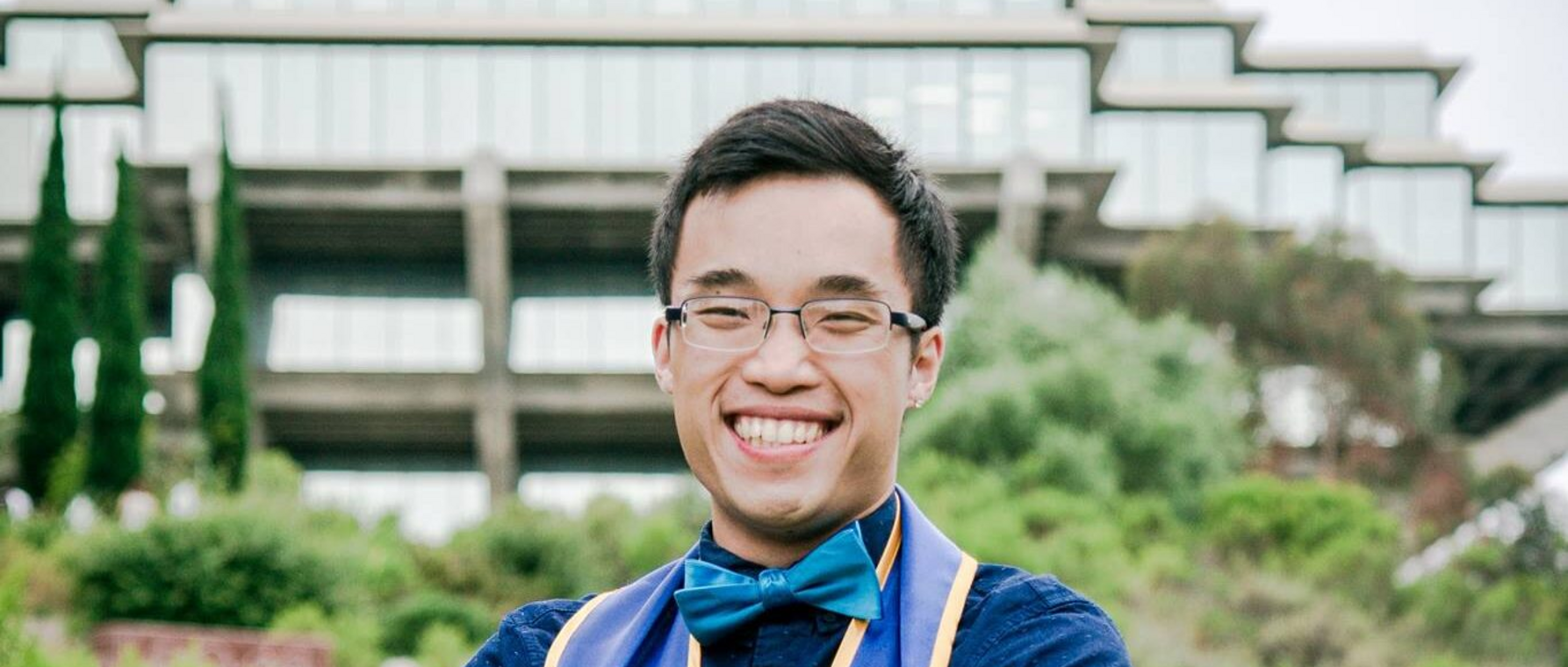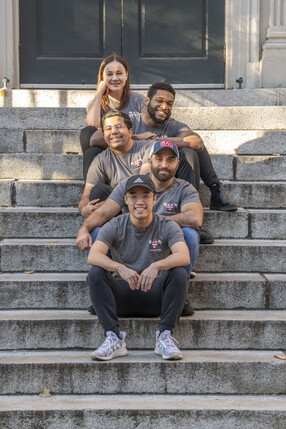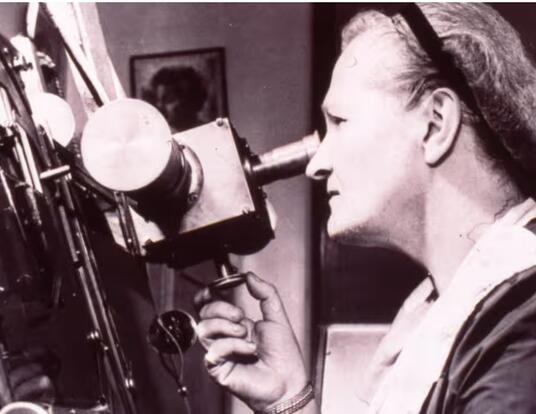Man in the Mirror
RA Shelton Lo reflects back to students the support that helped him shine

Shelton Lo’s first year at the University of California San Diego (UCSD) was also the first time he had ever been away from the family and friends he grew up with in his hometown of San Francisco. The weather was great in southern California, but the place, the people, and the community were completely new. It would have been easy for Lo to feel isolated and alone had it not been for Crystal Martinez.
“Crystal was my resident advisor (RA),” Lo says. “She was welcoming and warm and caring. Her door was always open, and I could be honest with her about how it felt to be away from my family for the first time. Things would have been very different if she hadn’t been there to support me. Now that I’m at Harvard, I want to do the same for others, so I became an RA myself.”
As a resident advisor in Child Hall, Shelton Lo takes joy in creating a welcoming and fun environment for the students at Harvard’s Graduate School of Arts and Sciences (GSAS) who live there. And while some might wonder why he adds to these responsibilities to those of a PhD student in population health sciences, Lo says that the work of an RA enables him to balance academics with work that he loves, making his GSAS experience more diverse and rich.
Balance and Engagement

In addition to Child, GSAS residence halls include Perkins and Conant, built in the 1890s, and Richards, built in 1950. (Both Richards and Child were designed by renowned architect Walter Gropius.) The halls have a capacity of more than 400 and are mostly populated by GSAS students, although those from other graduate schools at Harvard live there as well. Reflecting GSAS’s status as the University’s most international School, the halls are home to students who come to campus from around the world. About 60 percent of the students in the residence halls are from countries other than the United States.
GSAS has hired resident advisors like Lo to work in the halls since 1979. RAs get a room, up to 10 meals a week at GSAS Commons, and develop leadership, administrative, and interpersonal skills. Ashley Skipwith, director of the Office of Residential Life, says that RAs are an important source of information and support for the residents on the floor to which they are assigned.
“A significant part of living in the residence halls is community, which our RAs develop by welcoming students individually and hosting events throughout the year,” says Ashley Skipwith, director of residential life. “Residents can connect with one another at large and small events hosted by the RA team. RAs also bridge the gap between residents and campus resources, pointing students in the right direction on everything from trouble with facilities to counseling and mental health referrals.”
A serious student even during his undergraduate days at UCSD, Lo says that it’s always been a challenge for him to find a balance between his academic work and the rest of his life. In addition to allowing him to “pay forward” the kindness and hospitality he received in college, being an RA enables him to step away from his studies to engage with others—and with other parts of himself.
“If I was not an RA, I would probably spend a lot of time—too much time—just in research and classes,” he says. “In this position, I can really use my creative skills, my interpersonal skills, my social skills in a way that I can’t make use of them in academics. The residence halls are a place I can take a break from my work.”
Lo says that he has discovered new skills too. Now in his second year as an RA, he finds he has a talent and passion for organizing events. Lo says that a party or celebration takes some of the pressure off and enables him to connect with the residents he serves in a setting that’s welcoming and fun. Events also allow neighbors to connect with each other. “It’s less intimidating,” he says. “I can see them and talk to them. I really like creating a safe and fun space so that others can enjoy living in the residence hall and meeting new people.”
More Than a Place to Sleep
Lo says that the fall of 2021—his first as an RA—was definitely a time when folks needed help meeting new people. Most students were back on campus for the first time since the onset of COVID-19 in March 2020. There was a deep need to connect, but social skills were rusty and anxiety levels elevated after so many months in isolation. Moreover, many pandemic protocols—including masking, testing, and limits on group gatherings—were still in effect.
The environment was challenging, but it also enabled Lo to get creative with programming. He and fellow RA Yunyao Zhai organized a mid-autumn festival celebrating Asian heritage and community. Open to those living in any of the residence halls, the festival was an opportunity for students to connect again in a casual environment. Almost 100 of GSAS’s 400 residents attended. Afterwards, Lo heard from many that the event made the halls feel a little more like home.
“I had one student tell me that she moved here from China,” Lo says. “When she got to GSAS, she was worried about fitting in. She didn’t know anybody. She found out about the event from the fliers we posted. It gave her a chance to meet other members of the GSAS Asian community. More than that, it reminded her of home and her family’s cooking—especially the moon cakes.”
Lo’s job isn’t all festivals and tasty Asian treats. There’s administrative work to do. When a resident is locked out of their room, day or night, Lo often gets the call. And sometimes he has to juggle his personal feelings and his professional commitments.
“During the pandemic, we didn’t allow overnight guests,” he says. “A resident was in a long-distance relationship and couldn’t afford a hotel for his partner’s visit. He wanted to know if I could make an exception to the overnight policy. I couldn’t, but I let him know I understood how he felt. I had been in long-distance relationships myself. I gave him some more affordable options for housing when his partner visited. He was very understanding and in the spring term, when restrictions eased up a little, I got to spend time with them both.”
Beginning January 1, 2023 returning GSAS students and full-time registered Harvard graduate students who have lived in the residence halls for at least one term may apply to be resident advisors during the 2023–2024 academic year. (Check the Housing page on the GSAS website as well as Engage for a link to the application.) Residential Life Coordinator Mari Lentz-Köker says that the benefits of joining their team include a flexible schedule and lots of support from their fellow RAs—and from staff.
“The RA position can feel very intimidating at first, but each RA has the support of our office and each other,” says Lentz-Köker. “The beginning of the year is the busiest when you are meeting all your new residents and planning your first event, but after that, it gets so much easier. RAs can fit the position into their schedule however they need to, plan ahead, and ensure their responsibilities do not conflict with any academic priorities.”
Lo says the job can be stressful at times, but in a way that’s why he loves it. He wants to offer GSAS students the kind of support that his undergraduate resident advisor gave him—whether by hosting a big event that allows many people to connect or being there one-on-one when someone needs a sympathetic listener. He says that being there for people at their best and worst is one of the joys of being an RA.
“I want our residents to think of the halls as more than a place for them to sleep and shower,” he says. “I want this to be a place where they can be themselves, make friends, and find community. They can choose to come to an event or not. They can connect with me or not. But at least they know I’m there.”
Banner photo courtesy of Shelton Lo; RA photo by Tony Rinaldo
Get the Latest Updates
Join Our Newsletter
Subscribe to Colloquy Podcast
Simplecast





